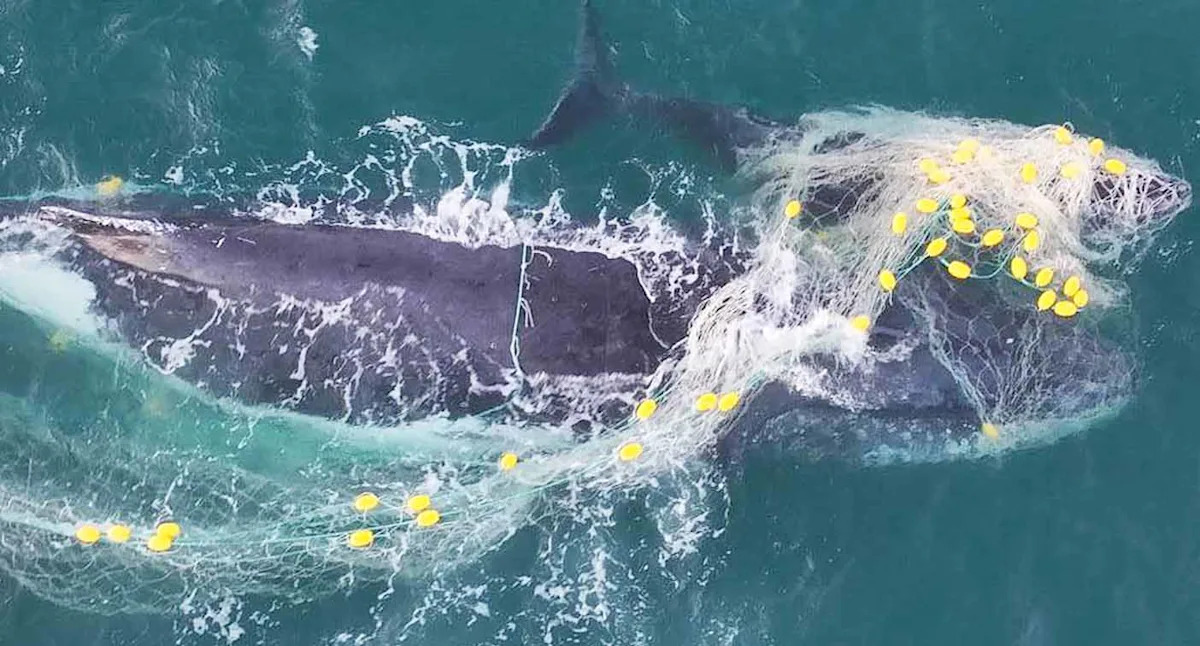Authorities have once again been called on to remove shark nets off Australia’s coastline after a mother and her calf were entangled on Wednesday night in a shocking incident described as “revolting”.
Photographer Geoff Aquino captured the “confronting” moment on his drone yesterday near Noosa National Park on Queensland’s Sunshine Coast. Geoff described the incident to Yahoo News as “by far the worst” he’s ever witnessed, adding it was entirely avoidable.
Geoff, along with many other residents and ocean advocates, including the Captain Paul Watson Foundation, is now calling for the immediate removal of the nets amid fears that entanglements are only going to continue.
Recalling the incident, he explained he saw a “big whale struggling to roll, which is not normal when you get entangled.” Geoff said the calf was trapped beneath her in the net, and she was attempting to manoeuvre herself out of the way so the youngster could catch a breath.
“It was suffocated,” he said. When the calf finally managed to take a breath, he described the moment as “gasping” for air.
Another witness, Taylor Ladd-Hudson, said it was the “most heartbreaking” whale entanglement she had ever seen. Like Geoff, she described the calf as “fighting for its breath” while the mother used “what little strength she has left to push her baby to the surface”.
Both Geoff and Taylor had sleepless nights worrying about the fate of the whales.
On Thursday, the Department of Primary Industries (DPI) confirmed to Yahoo News that the humpback whale and calf were successfully released from the shark net overnight.
“A Shark Control Program contractor attended the location last night (Wednesday), and facilitated a safe release, with the whales swimming away freely,” a spokesperson said.
The spokesperson urged the public, “for their own safety, it is dangerous to approach or try to release whales trapped in nets.”
DPI confirmed to Yahoo News the net will be replaced this morning. Noosa Council, in a statement, said it responded swiftly to reports of the entanglement. “Environment staff registered the incident with the Department of Agriculture, and Fisheries (DAF) who, due to their standard operating procedures, were unable to respond until dawn,” Noosa Council said on Thursday.
Calls to ‘urgently’ remove shark nets
Shark nets are one of the methods used to reduce the risk of interactions between sharks and humans at Australia’s most popular beaches. The Queensland DPI says the nets are “designed to catch sharks that pass through the area”.
But a report evaluating Queensland’s shark control program released earlier this year revealed an increasing number of non-target species are being killed. It’s the same story across the country. The KPMG report prepared for the Queensland government stressed that while “traditional measures” are still required, it should transition away from “environmentally harmful” practices like drumlines and mesh nets.
However, Queensland Government’s 2025-2029 shark program includes the expanded use of these control measures, and it ruled out the removal of nets during key whale migration periods over winter, with human safety coming before all else.
In NSW, a trial to remove some shark nets was put on hold following the fatal shark attack of a surfer at Dee Why Beach earlier this month.
Geoff is calling on the Queensland government to “urgently get the shark nets out” after returning to the scene of the incident this morning to see another group of whales with a calf in the same spot.
“They would have been trapped again,” he warned. “If we have shark nets there, it’s going to continue happening. It’s not going to stop.”
Will the mother and calf survive the entanglement incident?
While the whales have been freed, there are still grave fears that they may not survive the traumatic incident.
This week, Yahoo News reported on a whale that washed up dead at Kingscliff Beach, between Byron Bay and the Gold Coast.
After examining markings on its tail, Griffith University whale expert Dr Olaf Meynecke concluded it’s almost certainly the same animal that was freed by rescuers less than a week ago after it became tangled in fishing gear.
Only around 10 or 20 per cent of whales that become entangled are successfully assisted by rescuers. Some free themselves, and many die. Increasingly, humpbacks are documented to have scars caused by ropes from fishing gear or shark nets, but it’s unknown how many in total survive the ordeal.
Recently, the NSW Department of Environment (DCCEEW) recorded an increase in whale carcasses being washed up on beaches, which it attributes to the “significantly higher” number of humpbacks migrating along the coast.
And while the return of humpback whale populations is an incredible environmental win, Geoff argues as populations rise, so too will the number of entanglements in shark nets off Australia’s coast.
“At least remove them during whale season,” he said, adding he’s seen all types of species trapped in the nets, including sharks, dolphins, turtles, and even a sea snake.
Geoff wants to see people “love and appreciate” whales for their beauty, while Taylor hopes the incident can be used as “fuel” to find a better way to coexist with wildlife.
Do you have a story tip? Email: newsroomau@yahoonews.com.
You can also follow us on Facebook, Instagram, TikTok, Twitter and YouTube.


